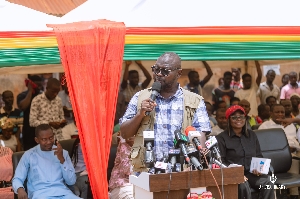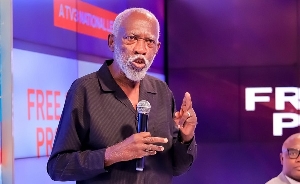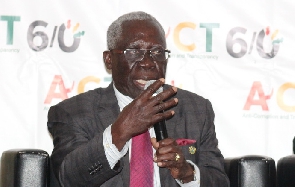 The substandard blocks being used to construct the classroom block
The substandard blocks being used to construct the classroom block
The people of Guzongo, a community in the Bawku West District, have uncovered scores of substandard bricks a building contractor is said to have gathered to construct a school block in that part of the Upper East region.
Workers were busy at the project site, merrily tuning from one radio station to another as the construction of the 3-unit classroom structure was going on, when the community members arrived, boldly questioning the quality of the blocks being used.
The bricks looked weather-beaten, obviously the basis of the community’s doubts and probe into their quality. Work came to a standstill as a foreman in charge of the project explained there was nothing wrong with the bricks except that they were beaten by rain soon after they were produced. Further to that, he said the bricks were good enough for the work being done.
Thoroughly unconvinced, the community members, led by the Chairman of the Sapeliga Area Council, Daniel A. Atiah, shook their heads in strong disapproval, saying the bricks were moulded with fewer bags of cement than the standard amount. But the foreman insisted they were made with the right quantity of cement. A group of loyal labourers stood firmly behind him, adding their voices as the uncompromising tone of the debate peaked.
To lay the dispute to rest, the community members decided to put the quality of the building materials to test. They applied what they had been taught by the Community Development and Advocacy Centre Ghana (CODAC Ghana), a civil society organisation promoting citizen participation in local governance and rural development in the region.

They lifted some of the questionable bricks to the knee level and dropped them to the ground. As they touched down in front of every eye at the site, they fell to pieces— showing they were shabby. Whilst the foreman and the workers stood dumbstruck, the community members counted out about two hundred exhausted-looking blocks they said were of poor quality.
“We are not happy,” reacted Mr. Atiah, who is also the Chairman of the Guzongo Unit Committee. “If we let the contractor use these blocks, one day we would have a big problem. It can happen that it is school time, children are there and there is a rainstorm or a windstorm. This [structure] can fall on our children. Besides, this is a complete waste of resources.”
Starr News learns the contractor, whose name is not immediately known, later replaced the rejected blocks with good-quality ones to complete the project. But the excluded blocks are still at the location.
Background of the Community Members
The community members did not just go to the site to demand answers on the quality of the building materials being used for the project.
The mission they undertook was motivated by the training they received under a project called Ghana’s Strengthening Accountability Mechanisms (GSAM). GSAM is a five-year project funded by the United States Agency for International Development (USAID) to “enable citizens hold their local authorities accountable and demand improved service delivery.”
A consortium made up of three organisations— Care International in Ghana, Oxfam in Ghana and the Integrated Social Development Centre (ISODEC)— has been tasked to implement the GSAM Project in 100 districts across Ghana from 2014 to 2019. CODAC Ghana is executing the project with Oxfam in Ghana in three districts in the region— Bawku West, Garu-Tempane (now two separate districts) and Pusiga.
“Basically, what we do is to train citizens on how to monitor capital projects in their various communities. Capital projects are buildings— buildings like schools, clinics, whatever infrastructure they are going to build in their communities. Every year, we identify two communities where the assembly has projects to implement. We pick the assembly’s annual plan and budget, look at the projects they have and we pick two communities from there to monitor.
“After the first year, we move from those two communities to other two communities. In Zebilla now, we have worked in about six communities so far. The projects in five of the communities are completed and they are in use. And when you do comparative analysis on those projects and the projects in other communities, you’ll see the quality of those projects,” the Executive Director of CODAC Ghana, Bukari Issaku, told Starr News.
He added: “Basically, we are monitoring quality and making the assemblies transparent and accountable. From the contracting stage, the community is involved in the project such that when the assembly is taking the contractor to site the community members are present. And it will be spelt clearly the type of project they are going to do in that particular community. We push them to ensure that they take part in the decisions that affect them.”
Town Hall Meeting
The communities where the GSAM Project is being implemented got another opportunity to pose more questions to the Bawku West District Assembly when CODAC Ghana, in collaboration with Oxfam in Ghana, organised a town hall meeting at Zebilla, the district capital.
Some of the questions raised dwelt on the failure of the assembly to affix two urinals to a new classroom block at Guzongo as contained in an original plan. A complaint was also lodged about the absence of a signpost which should have highlighted the details of the project at the site.
The Assistant District Planning Officer, Joseph Agbango, ascribed the exclusion of the urinals to the assembly’s inability to fully fund the project. But the Unit Committee Chairman for the area, very worried that the electorate would conclude he was not doing his work well, suggested the assembly get back to the community and explain the reason for the exclusion to them. In reply, the Assistant Planning Officer expressed doubts the assembly would be able to honour the suggestion, citing financial constraint as reason.
Another critical question participants presented had to do with some market stores at Zebilla they said had not been commissioned since 2012. They are not in use because the assembly reportedly is yet to settle some arrears owed a Tamale-based contractor who executed the project.
Addressing the meeting, the District Budget Officer, Moisob Dubik, emphasised the need for individuals in the communities to invest their resources wisely to help boost the local economy and for assembly members to attend assembly meetings, particularly fee-fixing resolution sessions, regularly. He also stressed the need for the communities to, as quickly as possible, report to the assembly any contractors caught executing shoddy projects.
The Upper East and Northern Zonal Project Officer for the GSAM Project, Cynthia Bawa, encouraged the participants not only to monitor the projects being implemented in their areas but also to lobby for projects on behalf of their communities.
“I’m very happy to mention that Guzongo community did something very wonderful. I was there yesterday and I spoke to one of the community monitors. What I heard was that they are happy, they are very satisfied with the project that is being given them, but they think it should go beyond the 3-unit classroom block because of the increased number of children. I was so excited.
“So, I asked him, ‘So, what are you doing as citizens, as community members, about this situation?’ He told me [that] through the project they had been educated to lobby the assembly; so, they’re doing that. And I was so, so excited. It’s going to be one of our success stories we will be telling in our news reports,” said Ms. Bawa.












